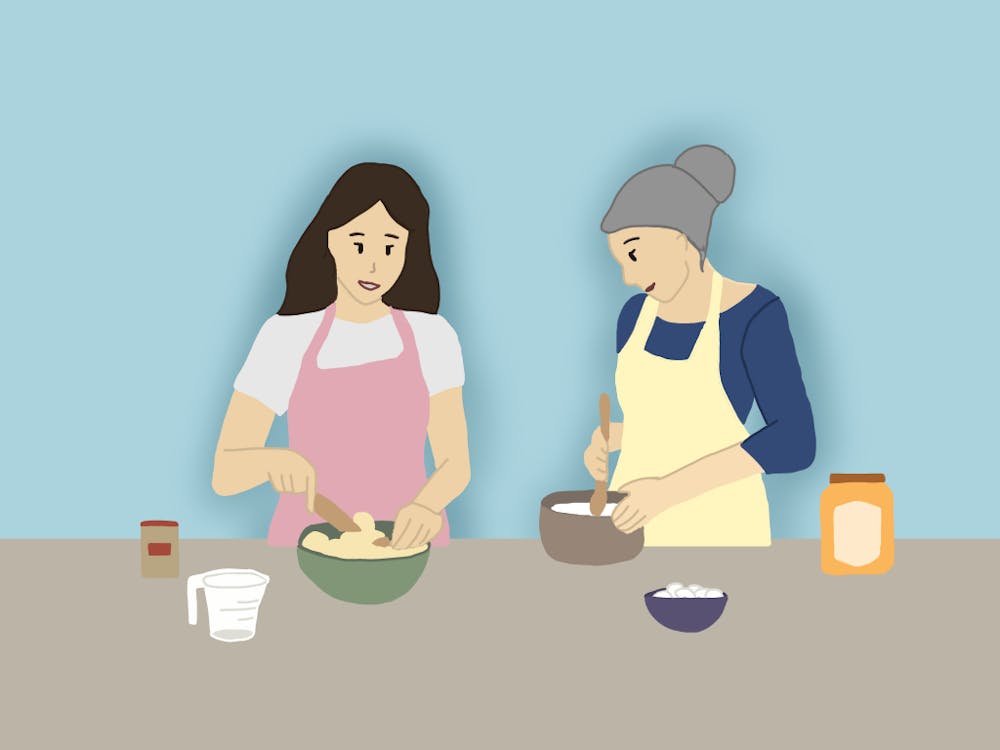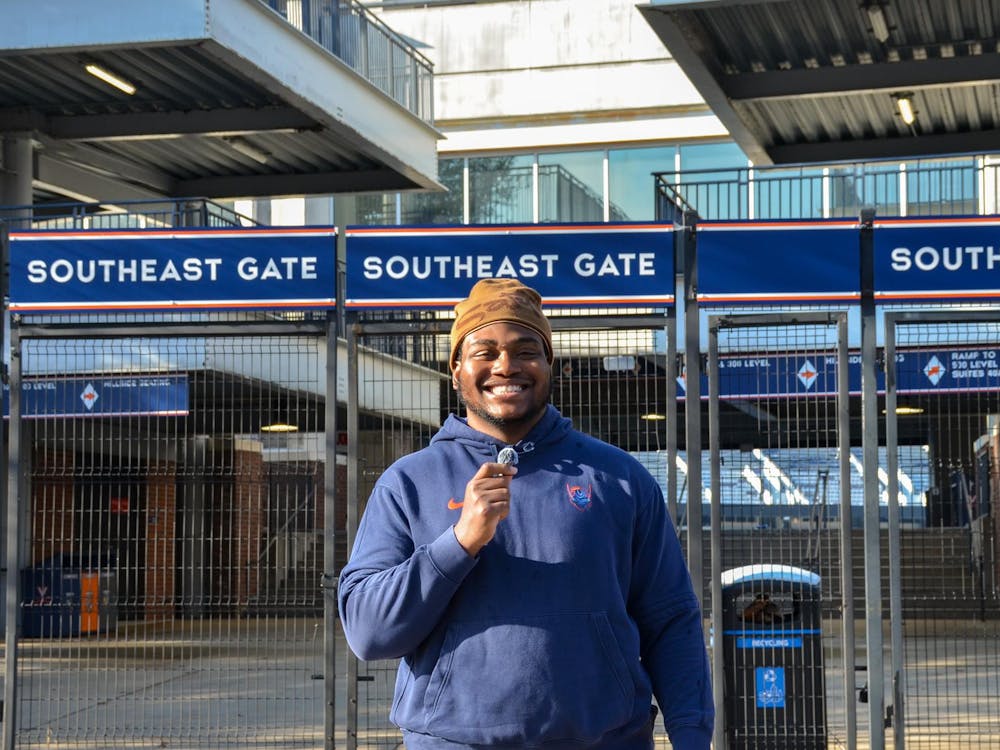It is a biologist's office -- there can be no doubt about that. Textbooks line the walls -- "Embryology," "Developmental Biology," "Genetics," among many others. A large computer screen blinks with different close-up photographs of nature -- fitting for a man who has devoted much of his life to its study.
Yet amid the piles of research papers covering the desk, there juts out a calendar, featuring a whole year's worth of Harley Davidson motorcycles. The calendar also is fitting for this man, who has spent years of his adult life infatuated with motorcycles.
This is the office of Raymond Keller, Chair of the Undergraduate Biology department. Though Keller's dual passion for biology and motorcycles is intriguing, it by no means is unique in the department. A number of his fellow faculty members -- among them his own wife -- also are devoted to both the science and the sport.
Rebel with a Cause
David Kittlesen, Professor of Biology and Director of Undergraduate Studies, always knew he wanted a motorcycle.
However, it wasn't until his 1990 move to Charlottesville -- where he followed his advisor to set up an Immunology firm -- that Kittlesen actually was able
to secure a bike.
"My parents wouldn't let me have one while I was growing up, though I desperately wanted one," Kittlesen said. "We were not a motorcycling family."
In retrospect, Kittlesen said he now believes waiting until he was mature enough was the best idea, referring to his biological back
ground for evidence.
"People in biological timing should study this," he said. "Something just clicks in the brain, and I swear it was like a switch in the brain when I turned 25."
To commemorate his move to the "quaint, very residential" Charlottesville, Kittlesen equipped himself with his very first motorcycle -- a 1983 Honda 250 street bike. Momo, as he affectionately calls it, gave him 20,000 miles; considerable mileage, he said, for such a small bike.
But the little Honda was only the beginning of a hobby that grew to be much larger. Now, 13 years after his first bike, Kittlesen has managed to collect three more motorcycles, and doesn't show any sign of stopping.
Kittlesen shrewdly noted that he got his first bike one year before meeting his wife.
"There's an important lesson there for the young guys," Kittlesen said. "Get the motor first, because then it's part of the package."Kittlesen not only convinced his wife to try out his prized motorcycle, but also used the bike to take her out on their first few dates.
"At the time we met that was my only transportation. So when I asked her out on our first date ..." he trails off, shrugging. "She wasn't too keen on it, but she relented. I don't think the bike acted as a chick magnet."
After his second bike, Kittlesen sold his first baby to two undergraduate University students. Pretty soon, though, he started hankering for a new toy, he said.
"So then I started getting the itch. I wanted something new, different," Kittlesen said. "I heard about another biologist and his motorcycles."
What followed was a visit to a barn literally packed with ancient motorcycle parts. From this "graveyard" of motorcycles, Kittlesen extracted a 1965 model, which holds a special significance for him.
"One of the reasons I chose that one is because I was born in 1965," he said. "I could have a bike that was my age."
Kittlesen took this dilapidated bike under his wing as a project and essentially created a new bike.
"It was a fun project," he said. "I could take this basket case and make it work again."
New bike, old passion
While Kittlesen has invested years of time and effort developing his motorcycle hobby, fellow professor Otto Friesen is a more recent bloomer.
Although Friesen purchased his first bike (a 600 cc Honda Shadow) only last March, his passion for motorcycles was born 37 years ago. Working in a lab in Chicago,
Friesen spent the entire summer of 1966 flitting back and forth between his lab and house on a motorcycle. However, Friesen had to put his hobby on hold for a while.
"With a family, everyone looks a little askance about riding a motorcycle," Friesen said. "So I waited till my kids left home. I didn't want to be a bad influence on them."
Free now to motorcycle to his heart's content, Friesen has amassed over 2,000 miles on his bike. Included in that mileage is the 190 miles he traveled on a group ride a few weeks ago. From 10 a.m. to 6 p.m., Friesen traversed the Valley and Blue Ridge Parkway with eleven others, getting caught in a thunderstorm during the outing.
"It was an easy ride because no one was pushing to get anywhere," Friesen said. "It was just fun getting out."
Although Friesen only recently got his own bike, motorcycling in some form has existed in his family for years.
"My father had a side car [with his motorcycle] and he took my mother around when they were courting," Friesen said. "That's ancient history and myth -- it was 1935, a long, long time ago."
Love and motorcycles
Keller has done his own share of courting via motorcycles. In fact, Keller introduced his wife Ann Sutherland, now an Associate Professor of Cell Biology in the Medical School, to motorcycles. Within a week, she was hooked.
"I gave her a motorcycle ride, and the next week she had a Motorcycle Safety Foundation course booklet. She's an independent woman, and she wanted her own bike," Keller said. "So then we rode together -- she on her bike, me on mine. We had a lot of adventures together."
After a year of weekend trips and long rides on the hills of California, the pair decided to take their first long trip together.
In a span of five weeks, they biked 5,500 miles, traveling through the back roads and small towns of the Midwest.
"It's the most satisfying thing I've ever done," Sutherland said. "As a scientist, you get wound up in what you're doing. [This trip] gave me perspective on where it all fits in life. Here's this guy scratching out a living in Nevada, and I'm complaining because my experiment didn't work."
Keller found solace through riding motorcycles, as well. Motorcycling found its way into Keller's life in 1979, when his post-doctorate advisor, Robert Briggs, introduced him to the sport as a way of alleviating stress.
"It made all the difference in the world. There's this business about risk and motorcycling. Well, the other aspect to it is freedom, imagination, self-control," Keller said. "I got into motorcycling because it's an endeavor that takes your whole soul."
The first summer Keller had his motorcycle, he took a big trip from Bloomington, Ind. to Woods Hole, Mass., where he gave a lecture in an embryology course. Keller's circuitous trip took him through the Ohio River Valley, West Virginia and then, Charlottesville.
"I parked right on the corner of Ellewood Ave and Main Street and came and walked around the campus," Keller said. "I wanted to see Mr. Jefferson's university."On the trip back home, Keller said he rode over 700 miles straight -- getting back to Indiana in a mere day.
Unlike Kittlesen, Keller grew up with a motorcycling-riding family. But Keller's father, who had crashed a few bikes himself, also discouraged Keller from getting a bike while he was young, calling the motorcycle "an old man's toy." Keller, who got his first bike at 35, now offers similar advice on motorcycling.
"It is a very intellectual but also a very emotional enterprise," Keller said. "A powerful, good-handling bike will let you explore the limits, but you have to know what those are. That's what makes them so dangerous and yet so intoxicating."
Keller said the skills that motorcycling demands of him -- accurately evaluating risk, maintaining a high attention level -- has made him more aggressive in exploring new ideas in science. There are times, he said, when a motorcycle ride is the key to unlocking a new concept in his mind.
"Sometimes I come back from rides and I'm exhausted, wringing wet from the exertion. I take a shower and take up something I was writing about, and I get a new perspective on it -- come at it totally fresh," Keller said. "It's like I sweated something out of my brain -- an impediment."
Sutherland said she has noticed a correlation between biologists and motorcycling, not just within the Biology department at the University, but even at Berkley, where there were many grads and post-docs riding.
"Maybe it's the logic that you have to get away from, get in touch with the real world," Sutherland mused. "In some ways you have to get back to the big picture of life, as opposed to the miniature picture you've been studying."
With 14 motorcycles crowding their three-car garage, Sutherland and Keller have a great deal of inspiration to choose from. The pair gradually collected their wide variety of motorcycles, thoroughly refurbishing each orphaned bike before adding it to the family.
"Each of them has a different personality when you ride them -- some are demure, others are so powerful that you can scare yourself with them," Sutherland said.
Regardless of the bike, however, each provides a lasting satisfaction for its rider.
"It's good for the soul," Sutherland said. "It really is."






